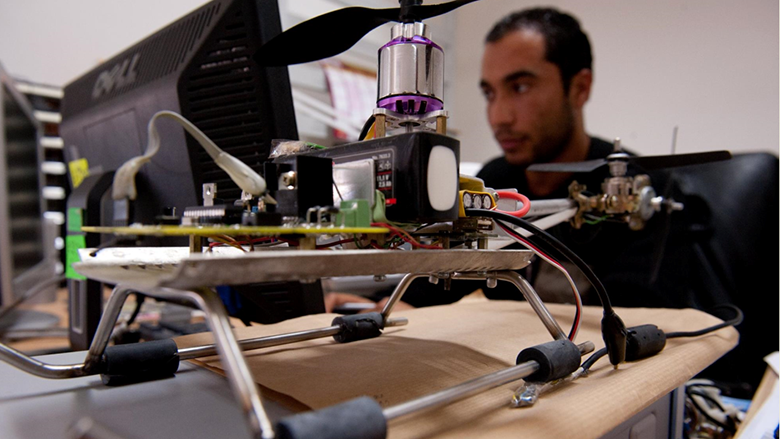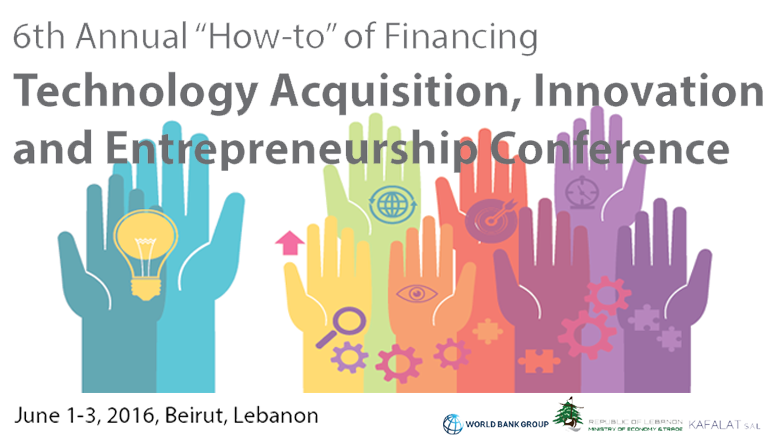Entrepreneurs and startups are often rich in ideas, but poor in financing and access to networks needed to jumpstart, grow and sustain their ventures.
This challenge was at the heart of last month’s “How-To” conference held in Beirut, Lebanon, where policymakers, investors, and entrepreneurs discussed how to improve financial and non-financial support to kick-start young businesses and generate jobs.
(MENA). Empirical research suggests . Since MENA has a large youth population, which is generally well educated but underemployed, nurturing startups is crucial for growth and prosperity.
Developing Innovative Financing Models
Participants discussed how to develop financing sources outside of the more typical (or sought after) equity investments from venture capital (VC) funds.
Filling gaps in the early stages of the financing lifecycle – angels, seed, and “super seed” funding – can help create deal flow and build investment pipelines.
For example, Palestine’s Ibtikar Fund is a fund looking to disrupt traditional financing patterns by using local accelerators to link seed-level financing with traditional VC financing. Accelerator programs provide technical assistance (mentorship, coaching, skills training) to address organizational, operational and strategic challenges firms face between seed and growth stage.
Participants also discussed what development finance institutions (DFIs) could do to provide support at the earlier stage and help create deal flow, even if it means taking more risks.
The European Investment Bank’s Venture Capital Financing Fund is an example of a DFI program that could be scaled up and linked to local accelerators to kick-start early-stage financing.
A related issue was how to build the capacity of fund managers. While a growing network of VCs in the region is examining start-up financing, they could benefit from additional training and mentoring that extends beyond the transactional relationship with entrepreneurs (i.e., writing a check). Resources to assist VCs with pipeline development, due diligence, portfolio risk management, and exit strategies can further improve the number and quality of deals VC firms finance in the region.
On the demand side, technical assistance should improve entrepreneurs’ capacity in preparing term sheets, negotiating with financiers, and improving investment readiness. This is important, considering that and .
Scale up Non-Financial Support Hubs
Young firms also greatly benefit from non-financial support that incubators, accelerators and other business development service (BDS) providers offer. The number of BDS providers has proliferated in recent years in the region. Many are fine-tuning their offerings, and unfortunately, are subject to short-term funding cycles, which limits their programming. Services by BDS providers could be further scaled up and better coordinated.
Most critical for the region now is to link various players – innovators, entrepreneurs, support centers, associations – with financing sources, explained Dr. Khater Abi Habib, Chairman and General Manager of Kafalat.
BDS providers in the region also need to connect with similar hubs in more advanced economies to learn how to improve and diversify services they offer to local startups.
Participants heard about business support models that Blackbox piloted in Silicon Valley, and global incubation programs that Endeavor and Mowgli have also brought into the region.
Participants also learned about programs other countries such as Lebanon, United States, Australia, and Morocco are implementing.
Giuseppe Gramigna, Chief Economist of the US Small Business Administration (SBA), discussed the Small Business Investment Companies (SBIC) and its role in validating the commercial validity of new businesses through private investment funds supported by SBA guarantees.
Emerging Technical Models
While banks may continue to dominate in the traditional financial sector, financial technology (Fintech) provides new avenues to formalize informal business activity and promote financial inclusion among micro-firms.
Participants also heard from Liwwa, a peer-to-peer lending network, which connects borrowers to investors through an online credit marketplace, and sells credit reports to banks using alternative data sources (bank checks, third party analytics).
The Consultative Group to Assist the Poor (CGAP) covered how digital platforms can improve access to financial services, such payments, savings, and credit.
Tom Jacobs, IFC’s Resident Representative for the Mashreq region, facilitated a discussion on how financial institutions support renewable and energy-efficient technology.
Sustainable energy financing is a priority for authorities and financial institutions across the region, considering energy scarcity and its impact on doing business.
Fransabank, the third largest banking group in Lebanon, shared its experience in scaling up lending operations to companies and households keen to purchase green technology. The panel also presented start-ups active in the innovative clean tech space, including Energy 24, which provides clean energy platforms to power commercial loads during long power outages.
The Road Ahead
Randa Akeel, Senior Economist at the World Bank and manager of an early stage equity project in Lebanon and another under preparation in Morocco, synthesized themes for moving forward.
- Fund managers and BDS providers need to improve data to assess the impact of the entrepreneurship ecosystem on jobs, productivity, women’s employment, and poverty reduction.
- Use public subsidies to crowd in VC and private equity players and develop the market, particularly to support riskier firms in underdeveloped areas.
- Expand entrepreneurship beyond capital cities across the region, and diversify beyond the high tech sector.
- Further develop early stage innovation financing, including angel investing networks, social impact bonds, and Fintech lending platforms (including peer-to-peer lending, exploiting big data, and psychometric testing).
The conference was hosted jointly by the World Bank Group, Kafalat (Lebanon’s national credit guarantee agency) and the Lebanese Ministry of Economy and Trade.


